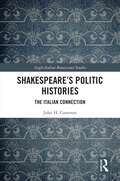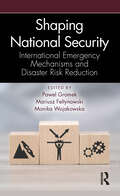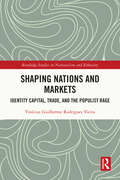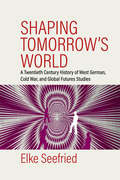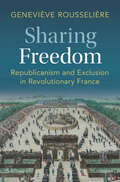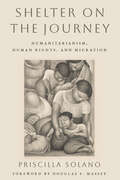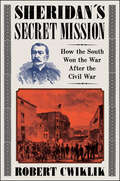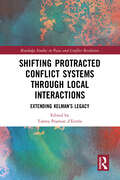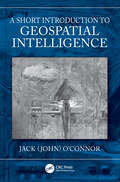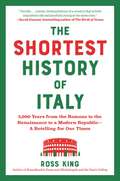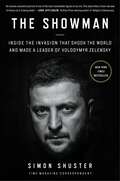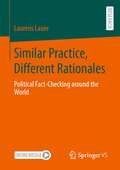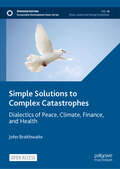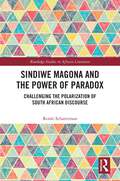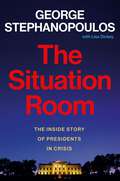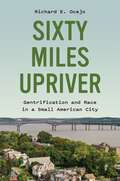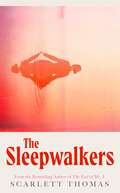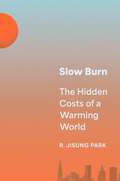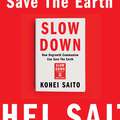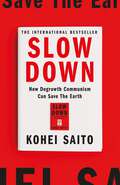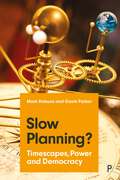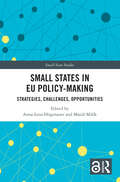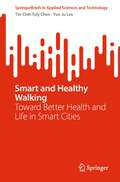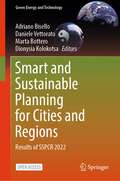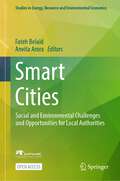- Table View
- List View
Shakespeare’s Politic Histories: The Italian Connection (Anglo-Italian Renaissance Studies)
by John H. CameronThis book argues that Shakespeare's first tetralogy is informed by the Italian ‘politic histories’ of the early modern period, those works of history, inspired by the Roman historian Tacitus, that sought to explore the machinations of power politics in governance and in the shaping of historical events; that a close reading of these Italian ‘politic histories’ will greatly aid our understanding of the ‘politic’ qualities dramatized in Shakespeare’s early English History plays; that the writings of Niccolò Machiavelli in particular will likewise aid to such understanding; that these ‘politic histories’ were available (in a variety of forms) to many English early modern writers, Shakespeare included, and are thus helpful as grounds for political and strategic analogy and for informing our reading of Shakespeare's politic histories. While a reading of the Italian ‘politic’ historians can aid in our understanding of Shakespeare’s achievement, we should regard the English History plays as ‘politic histories’ in their own right, i.e. as dramatized versions of precisely the same kinds of ‘politic’ historical writing, with its emphasis on ragion di Stato or raison d’état. This emphasis on what the Elizabethans called ‘stratagems’ suggests new ways to read the plays and to interpret the motivation and action of its characters, ways that challenge some of our more established reading of the plays’ ‘Machiavellian’ characters (particularly Richard III) and suggest far greater strategic acumen on the part of previously overlooked characters (particularly Buckingham and Stanley), providing new ways to read the Shakespeare's politic histories and to better appreciate their Italian connection.
Shaping National Security: International Emergency Mechanisms and Disaster Risk Reduction
by Pawel Gromek Mariusz Feltynowski Monika WojakowskaShaping National Security: International Emergency Mechanisms and Disaster Risk Reduction presents international emergency mechanisms relative to disaster risk reduction (DRR). The goal is to share knowledge about existing frameworks, and utilize established DRR policies and programs, as another means to reinforce and strengthen national security in countries around the world. The book outlines, in detail, the United Nations Disaster Assessment and Coordination (UNDAC), the International Search and Rescue Advisory Group (INSARAG), the North Atlantic Treaty Organisation (NATO) and the Union Civil Protection Mechanism (UCPM) DRR programs. While these entities’ versions of DRR best practices are largely directed at decreasing the impact of disaster hazards, limiting relevant exposure, local vulnerabilities, increasing capacities to cope with disaster, the authors present these frameworks as potential tools, and effective means, to support national security efforts. This is especially important in disaster circumstances when local, and national emergency resources, may be insufficient to face hazards and multi-hazards, and result in cascading effects to occur as hazard events transpire. Chapters present various resources available to them, through these programs, to encourage authorities from every country to effectively apply the mechanisms—and emergency mechanisms specifically—to offer domestic solutions. Due to these programs proven track records in providing organisational standards, the use of such mechanisms can serve as both the basis to foster sound DRR practices and, by extension, can supplement resiliency, security, and continuity within countries. This concept is based on the premise that the UNDAC, INSARAG, NATO and ECPM emergency mechanisms have been developed to be implementable (directly or indirectly) in every country in the world when disasters occur. Shaping National Security takes a "big-picture," holistic view of DRR and national security to offer innovative ideas and solutions to professionals and officials working in disaster management, disaster risk reduction, emergency management, crisis management, civil protection, public security management, national security, criminal justice, international studies, and homeland security.
Shaping Nations and Markets: Identity Capital, Trade, and the Populist Rage (Routledge Studies in Nationalism and Ethnicity)
by Vinícius Guilherme Rodrigues VieiraShaping Nations and Markets employs a mixed methods approach to contend that economic ideas, organization of domestic interests and their economic power, asymmetries of information, and political institutions do not sufficiently explain the formation of national interests in processes of trade liberalization. The author proposes that something is missing—identity capital—which also empowers economic sectors that share either liberalizing or protectionist interests. Identity capital is an economic sector’s contribution to the stability of a national identity narrative; it correlates with the degree to which the workforce of any sector represents the dominant conception of national identity. Identity capital creates political power asymmetries among those sectors and impacts the formation of populist movements in both developed and developing states. This book offers a theoretical framework to unpack national identity, trade liberalization, nationalist-populism, domestic politics, and globalization. The author argues that the key for identifying whether liberalizing or protectionist coalitions prevail in trade negotiations is identity capital. He offers a comparison of the three largest contemporary, federal, multicultural democracies: Brazil, India, and the United States, from the Doha Development Round of the World Trade Organization (WTO) in 2001, to the rise of populism in these countries in recent years. This book will be of great interest to graduate students and scholars of international relations, international studies, political science, comparative politics, and economic sociology.
Shaping Tomorrow's World: A Twentieth-Century History of West German, Cold War, and Global Futures Studies
by Elke SeefriedShaping Tomorrow’s World tells the crucial story of how futures studies developed in West Germany, Europe, the US and within global futures networks from the 1940s to the 1980s. It charts the emergence of different approaches and thought styles within the field ranging from Cold War defense intellectuals such as Herman Kahn to critical peace activists like Robert Jungk. Engaging with the challenges of the looming nuclear war, the changing phases of the Cold War, ‘1968’, and the growing importance of both the Global South and environmentalism, this book argues that futures scholars actively contributed to these processes of change. This multiple award-winning study combines national and transnational perspectives to present a unique history of envisioning, forecasting, and shaping the future.
Sharing Freedom: Republicanism and Exclusion in Revolutionary France
by null Geneviève RousselièreThe French have long self-identified as champions of universal emancipation, yet the republicanism they adopted has often been faulted for being exclusionary – of women, foreigners, and religious and ethnic minorities. Can republicanism be an attractive alternative to liberalism, communism, and communitarianism, or is it fundamentally flawed? Sharing Freedom traces the development of republicanism from an older elitist theory of freedom into an inclusive theory of emancipation during the French Revolution. It uncovers the theoretical innovations of Rousseau and of revolutionaries such as Sieyès, Robespierre, Condorcet, and Grouchy. We learn how they struggled to adapt republicanism to the new circumstances of a large and diverse France, full of poor and dependent individuals with little education or experience of freedom. Analysing the argumentative logic that led republicans to justify the exclusion of many, this book renews the republican tradition and connects it with the enduring issues of colonialism, immigration, slavery, poverty and gender.
Shelter on the Journey: Humanitarianism, Human Rights, and Migration
by Priscilla SolanoMigration journeys are arduous, with migrants tormented by risk, abuse, threats, and xenophobia. Shelters, staffed by humanitarian workers and volunteers, provide safe spaces for those in transit. Shelter on the Journey examines how these sites, often faith-based civil society associations, create solidarity and help politicize migrants, giving them a sense of themselves as an empowered, rights-holding people. Solano, who volunteered at shelters in Mexico, chronicles the activity in three of the nearly 100 shelters along a unique humanitarian trail that many Central Americans take to reach the United States. She outlines the constraints faced by these sites and their potential to create social transformation and considers how and why migration security is currently framed and managed as both a criminal and humanitarian issue. Shelter on the Journey explores the politics of the shelters, their social world, and the dynamics of charity and solidarity, as well as the need for humanitarian assistance and advocacy for dignified and free transit migration.
Sheridan's Secret Mission: How the South Won the War After the Civil War
by Robert CwiklikA deeply researched, narrative history recounting the little-known late–Reconstruction era mission of General Philip Sheridan, a Union Army hero dispatched to the South ten years after the Civil War to protect the rights of newly freed black citizens, who were under siege by violent paramilitary groups like the White League intent on erasing their postwar gains.In late 1874, nearly ten years after the Civil War, former slaves, or freedmen, found themselves under siege in the South by violent paramilitary groups like the White League, intent on erasing their newly won voting rights and other postwar gains and consigning them to a condition little better than slavery. President Ulysses S. Grant, vowing to enforce, “with rigor,” laws protecting the rights of former slaves, asked General Philip H. Sheridan to visit New Orleans and other Southern trouble spots to investigate the freedmen’s plight, all while pretending to be on vacation. Sheridan’s Secret Mission recounts the feisty Union war hero’s Southern sojourn amid tragic episodes of racial terror that ultimately fueled the overthrow of Reconstruction-era protections for black rights.Sheridan made a splash on his arrival in New Orleans on New Year’s Eve, accompanied by family and friends and proclaiming they were sightseers bound for Cuba. But a few days later, through trickery and force, Democrats seized control of the nearby state House of Representatives, apparently assisted by White League operatives, although the state’s majority black electorate had arguably put Republicans, the party of Lincoln and the freeing of the slaves, in control of the legislature.Federal soldiers stationed nearby ushered several Democrats out of the House chamber, and Sheridan publicly denounced the “spirit of defiance to all lawful authority” in Louisiana. He threatened to round up White League leaders to face trial before military tribunals. In years past, Northerners might have rallied to support the Union hero. But the public was weary of war issues. Many Northern newspapers condemned Sheridan’s actions and deplored the appearance of federal bayonets in a sovereign state legislature. Some called for Grant’s impeachment.The controversial clash in the Louisiana legislature lies at the heart of this revelatory new narrative history. Sheridan’s Secret Mission illuminates the bitter career of racial oppression in the United States and resonates powerfully with our contemporary “post-racial” condition.
Shifting Protracted Conflict Systems Through Local Interactions: Extending Kelman’s Legacy (Routledge Studies in Peace and Conflict Resolution)
by Tamra Pearson D’EstréeThis volume explores the evolution of theoretical and practical approaches to intervening in protracted conflicts, following the work of Herb Kelman. Interactive problem solving, as developed by Kelman and others, sought to increase understanding about the microprocesses of international relations. Kelman early on emphasised the centrality of an interactive approach for constructing new identities, new narratives, and new ways forward. Transforming conflict systems requires strategic attention to the interactions between agents of change that provide stability or induce shift. This volume on interactive conflict approaches includes both critical reflections and new ideas from scholar-practitioners who have developed, revised, and expanded these approaches. Contributors take up important issues, from the shape and likelihood of solutions in intractable conflicts to how individuals can exist in realities with seemingly irresolvable inner and outer conflicts. The volume represents the best of current thinking about how the mechanisms, theoretical framework, and application of interactive problem solving should be moved into the twenty-first century context of increasing complexity, increasing uncertainty, and increasing polarisation. This book will be of interest to students of peace studies, conflict resolution, and international relations.
A Short Introduction to Geospatial Intelligence
by Jack O'ConnorA Short Introduction to Geospatial Intelligence explains the newest form of intelligence used by governments, commercial organizations, and individuals. Geospatial intelligence combines late 20th century historically derived ways of thinking and early 21st century technologies of GIS, GPS, digital imaging satellites and communications satellites to identify, measure, and analyze the current risk in the world. These ways of thinking have developed from military engineering, cartography, photointerpretation, and imagery analysis. While the oldest example dates back to the early 16th century, all the ways of spatial thinking share the common thread of being developed and refined during conflicts to help military leaders make informed decisions prior to action. In the 21st century— thanks in great part to advances in digital precision technology, miniaturization, and the commercialization of satellites— these ways of thinking have expanded from the military into various other industries and sectors including energy, agriculture, environment, law enforcement, global risk assessment, and climate monitoring. Features: • Analyzes human and algorithmic models for dealing with the challenge of analytic attention, in an age of geospatial data overload • Establishes an original model— envisioning, discovery, recording, comprehending, and tracking— for the spatial thinking that underpins the practice and growth of this emerging discipline • Addresses the effects of small satellites on the collection and analysis of geospatial intelligence A Short Introduction to Geospatial Intelligence describes the development of the five steps in geospatial thinking— envisioning, discovery, recording, comprehending, and tracking— in addition to addressing the challenges, and future applications, of this newest intelligence discipline.
The Shortest History of Italy: 3,000 Years From The Romans To The Renaissance To A Modern Republic?a Retelling For Our Times (Shortest History #0)
by Ross KingDiscover the prodigious global influence of il bel paese in this star-studded retelling of Italy’s past—from a foremost author of historic Italy. The Shortest History books deliver thousands of years of history in one riveting, fast-paced read. “Each page brims with Bill Bryson-like trivia that is sure to delight.”—Booklist, starred review The calendar. The Senate. The university. The piano, the heliocentric model, and the pizzeria. It’s hard to imagine a world without Italian influence—and easy to assume that inventions like these could only come from a strong, stable peninsula, sure of its place in the world. In this breakneck history, bestselling author Ross King dismantles this assumption, uncovering the story of a land rife with inner uncertainty even as its influence spread. As the Italian tale unfolds, prosperity and power fluctuate like the elevation in the Dolomites. If Rome’s seven hills could talk, they might speak of the glorious time of Trajan—or bemoan the era of conquest and the Bubonic Plague that decimated Rome’s population. Episodes of wealth like the First Triumvirate and the time of the Medicis are given fresh life alongside descriptions of the Middle Ages, the early days of Venice, the invasion of Napoleon, and the long struggle for unification. Highlighting key events and personalities, King paints a vibrant portrait of a country whose political and cultural legacies enrich our lives today.
The Showman: Inside the Invasion That Shook the World and Made a Leader of Volodymyr Zelensky
by Simon Shuster“The Showman surpasses all similar efforts to date and is set to be the standard by which all other works on Mr. Zelensky and Ukraine’s wartime politics will be judged." —Wall Street JournalA monumental account of Russia’s invasion of Ukraine and the forging of a leader, The Showman provides an insider’s perspective on the war reshaping our world, based on unprecedented access to Volodymyr Zelensky and the high command in Kyiv.Time correspondent Simon Shuster chronicles the life and leadership of Volodymyr Zelensky from the dressing rooms of his variety shows to the muddy trenches of Ukraine’s war with Russia. Based on four years of reporting; extensive travels with President Zelensky to the front; and dozens of interviews with him, his wife, his friends and enemies, his advisers, ministers and military commanders, Shuster tells the intimate and revealing story of the president’s evolution from a slapstick actor to a symbol of resilience.In their most candid accounts of the war so far, members of Zelensky’s inner circle show how the president’s character changed under the strains of leadership and the horrors he witnessed each day. His wife, First Lady Olena Zelenska, describes her escape from Kyiv with their children, her life on the run, and the tensions that emerged in her marriage as she struggled to return to a meaningful role in the administration. Ukraine’s top military commander, General Valery Zaluzhny, shares the untold story of his fraught relationship with the president and the subsequent consequences.Reflecting on their own regrets and critical decisions, Zelensky and his senior aides open up about the causes of the Russian invasion and how it may have been avoided. They describe with astonishing frankness how their peace talks with Vladimir Putin fell apart and how their faith in the U.S. faltered, both under Donald Trump and Joe Biden.The Showman provides the first inside account of Zelensky’s life amid the invasion, offering a clear-eyed view of his failures to prepare for it and his willingness to silence dissent under martial law. What emerges is a complex picture of a man struggling to break what he sees as a historical cycle of oppression that began generations before he was born. Even as the war drags on, Zelensky lays out his vision for its future course and, through his actions, demonstrates his strategy for countering the Russians and keeping the West on his side.The Showman, as a work of eyewitness journalism, provides an essential perspective on the war defining our age, resulting in a riveting, vivid portrait of the invasion as experienced by its number one target and improbable hero.
Similar Practice, Different Rationales: Political Fact-Checking around the World
by Laurens LauerMisinformation and disinformation have emerged as paramount societal challenges, affecting areas from public health to climate change and eroding both social understanding and democratic values. Enter the political fact-checkers: stalwart defenders of accurate public information and guardians of robust public discourse. What began as an endeavor to verify political claims in the U.S. has transformed into a global movement addressing diverse forms of public information, harnessing innovative tech tools, championing media literacy, and exploring governance solutions. Who are these fact-checkers, and how have they become such a versatile force against misinformation? While united by very similar verification practices, the community of fact-checkers is remarkably diverse. Reflecting the media-political landscapes they navigate, these initiatives bring together a spectrum of professional expertise, visions, and strategies. This book delves into this fascinating world, exploring how the concept of fact-checking has proliferated globally. Spotlighting efforts in Argentina, Georgia, Italy, and the U.S., it offers an in-depth understanding of fact-checkers' approaches, their alignment with distinct environments, and their potential impact on modern public discourse.
Simple Solutions to Complex Catastrophes: Dialectics of Peace, Climate, Finance, and Health (Sustainable Development Goals Series)
by John BraithwaiteThis open access book sets out simple solutions to managing complex catastrophes. It focusses on four kinds of crises – climate change, crime-war cascades, epidemics and financial crises. These catastrophes are conceived as complex and prone to cascade effects. This book is optimistic in explaining that there are identifiable simple institutions that international society can strengthen and some simple principles that can help humankind to control the expanding gamut of complex catastrophes that confront the planet including simple, stable institutions and regulatory bodies. It draws on a wide range of current and past crises and challenges, from the Cold War to COVID-19, and from Weapons of Mass Destruction to restorative diplomacy with States like China, to provide an urgent and timely path forward. It speaks to those interested in criminology, public policy and international relations, political science, sociology, public health and economics.
Sindiwe Magona and the Power of Paradox: Challenging the Polarization of South African Discourse (Routledge Studies in African Literature)
by Renée SchattemanThis book examines the work of Sindiwe Magona, one of South Africa’s most prolific and groundbreaking writers, widely recognized for highlighting the everyday experiences of women and the domestic side of apartheid. A pioneer among black African women writers, she is equally respected as storyteller, advocate for children’s education, activist for HIV/AIDS awareness, and champion of indigenous languages. In this book, Renée Schatteman contends that Magona’s most important contribution comes through her refusal to choose sides in the contentious debates that have polarized public discourse following apartheid. By straddling two (or more) sides of a controversy and challenging any who do harm to others (and to the nation), regardless of their position, she blurs distinctions that are assumed to be absolute, opens new avenues of understanding, and inspires alternative visions for the future. By occupying the space of paradox, she undermines the closed epistemological structures inherited from apartheid and champions the need for interdependence, truth-telling, and dialogue. Covering her creative production over three decades (which includes novels, autobiographies and biographies, short story collections, children’s books, and literature about HIV/AIDS), this book is an essential read for Magona enthusiasts as well as for researchers of African literature and postcolonial South Africa.
The Situation Room: The Inside Story of Presidents in Crisis
by George StephanopoulosGeorge Stephanopoulos, the legendary political news host and former advisor to President Clinton, recounts the history-making crises from the place where twelve presidents made their highest-pressure decisions: the White House Situation Room. No room better defines American power and its role in the world than the White House Situation Room. And yet, none is more shrouded in secrecy and mystery. Created under President Kennedy, the Sit Room has been the epicenter of crisis management for presidents for more than six decades. Time and again, the decisions made within the Sit Room complex affect the lives of every person on this planet. Detailing close calls made and disasters narrowly averted, THE SITUATION ROOM will take readers through dramatic turning points in a dozen presidential administrations, including: Incredible minute-by-minute transcripts from the Sit Room after both Presidents Kennedy and Reagan were shot The shocking moment when Henry Kissinger raised the military alert level to DEFCON III while President Nixon was drunk in the White House residence The extraordinary scene when President Carter asked for help from secret government psychics to rescue American hostages in Iran A vivid retelling of the harrowing hours during the 9/11 attack New details from Obama administration officials leading up to the raid on Osama Bin Laden And a first-ever account of January 6th from the staff inside the Sit Room THE SITUATION ROOM is the definitive, past-the-security-clearance look at the room where it happened, and the people—the famous and those you've never heard of—who have made history within its walls.
Sixty Miles Upriver: Gentrification and Race in a Small American City
by Richard E. OcejoAn unvarnished portrait of gentrification in an underprivileged, majority-minority small cityNewburgh is a small postindustrial city of some twenty-eight thousand people located sixty miles north of New York City in the Hudson River Valley. Like many other similarly sized cities across America, it has been beset with poverty and crime after decades of decline, with few opportunities for its predominantly minority residents. Sixty Miles Upriver tells the story of how Newburgh started gentrifying, describing what happens when White creative professionals seek out racially diverse and working-class communities and revealing how gentrification is increasingly happening outside large city centers in places where it unfolds in new ways.As New York City&’s housing market becomes too expensive for even the middle class, many urbanites are bypassing the suburbs and moving to smaller cities like Newburgh, where housing is affordable and historic. Richard Ocejo takes readers into the lives of these newcomers, examining the different ways they navigate racial difference and inequality among Newburgh&’s much less privileged local residents, and showing how stakeholders in the city&’s revitalization reframe themselves and gentrification to cast the displacement they cause to minority groups in a positive light.An intimate exploration of the moral dilemma at the heart of gentrification, Sixty Miles Upriver explains how progressive White gentrifiers justify controversial urban changes as morally good, and how their actions carry profound and lasting consequences for vulnerable residents of color.
The Sleepwalkers
by Scarlett ThomasThe scintillating new novel from the author of The End of Mr YPatricia Highsmith meets White Lotus in this compulsive and brilliant gothic thriller &‘Clever, emotionally resonant, packed with startling twists and dark turns and very funny indeed, this is fiction roaring on all cylinders.&’ Guardian &‘Through her bold storytelling, &“The Sleepwalkers&” becomes a work of peculiar, gonzo genius. … Thomas takes a glamorous late-capitalist setting, with rosé and catamarans, and shreds, twists and warps it into a story that is surprising, humane and political to its bones.&’ New York Times &‘Like a darker, funnier The White Lotus, The Sleepwalkers is horrifying in the best possible way. I loved every moment of it.&’ James Smythe &‘The Sleepwalkers is brilliant, savage and hilarious. The voice is so strong and so distinctive from the get-go, so bold and pitilessly funny. There is no whingeing here, just a fearless takedown which I read through in a single streak of pure delight. This is Scarlett's best yet, and I don't say that lightly.&’ Bidisha Mamata'The Sleepwalkers is never-endingly surprising and full of keen observations on relationships, politics, and art. Thomas makes real life so fraught with meaning, it feels hauntingly supernatural. A twisty Gothic tale of vertiginous depths and haunting power.' Sandra Newman, author of Julia 'This original thriller has plenty of surprises.' Good Housekeeping 'An attractive summer holiday read', Independent Still reeling from the chaos of their wedding, Evelyn and Richard arrive on an idyllic Greek island for their honeymoon. It&’s the end of the season and out at sea a storm is brewing. They check in to an exclusive hotel, the Villa Rosa, where the proprietor Isabella — a strangely intense woman of indeterminate accent — flirts outrageously with Richard while treating Evelyn with a rudeness bordering on contempt. Isabella tells them the story of 'the sleepwalkers': a couple who stayed at the hotel the year before and drowned in a tragic and unexplained accident. It starts to feel like the entire island is obsessed with 'the sleepwalkers', but what at first seems like a fun tale to tell before bed quickly evolves into a living nightmare. Caught in a web of deception and intrigue, where nothing and nobody are quite what they seem, Evelyn and Richard discover that their island paradise may in fact be hell on earth and that their only means of escape is to confront dark truths about themselves and those they love. Exhilarating, suspenseful, and subversively funny, in The Sleepwalkers Thomas takes elements on Daphne Du Maurier and Patricia Highsmith and blends them with her own unique sensibility to create an unforgettable thriller of rare intelligence that cements her reputation as the most exciting and original author of her generation. &‘Muriel Spark&’s disreputable niece.&’ Spectator &‘She's a genius.&’ Douglas Coupland &‘Thomas has the mesmerising power of a great story teller.&’ Financial Times &‘One of the most startling, unpredictable writers of her generation.&’ Scotsman
Slow Burn: The Hidden Costs of a Warming World
by Robert Jisung ParkHow the subtle but significant consequences of a hotter planet have already begun—from lower test scores to higher crime rates—and how we might tackle them todayIt&’s hard not to feel anxious about the problem of climate change, especially if we think of it as an impending planetary catastrophe. In Slow Burn, R. Jisung Park encourages us to view climate change through a different lens: one that focuses less on the possibility of mass climate extinction in a theoretical future, and more on the everyday implications of climate change here and now.Drawing on a wealth of new data and cutting-edge economics, Park shows how climate change headlines often miss some of the most important costs. When wildfires blaze, what happens to people downwind of the smoke? When natural disasters destroy buildings and bridges, what happens to educational outcomes? Park explains how climate change operates as the silent accumulation of a thousand tiny conflagrations: imperceptibly elevated health risks spread across billions of people; pennies off the dollar of productivity; fewer opportunities for upward mobility.By investigating how the physical phenomenon of climate change interacts with social and economic institutions, Park illustrates how climate change already affects everyone, and may act as an amplifier of inequality. Wealthier households and corporations may adapt quickly, but, without targeted interventions, less advantaged communities may not.Viewing climate change as a slow and unequal burn comes with an important silver lining. It puts dollars and cents behind the case for aggressive emissions cuts and helps identify concrete steps that can be taken to better manage its adverse effects. We can begin to overcome our climate anxiety, Park shows us, when we begin to tackle these problems locally.
Slow Down: How Degrowth Communism Can Save the Earth
by Kohei SaitoWill green capitalism save the planet? Is it even trying?Not when the very logic of the capitalist system pits it against Earth's life-support systems, as the Japanese philosopher Kohei Saito demonstrates in this astonishing international bestseller.Drawing on cutting-edge research across multiple disciplines, Saito shows how nothing but a transformation of our economic life can save us from climate collapse. Karl Marx himself reached this breakthrough at theend of his life, long before climate change had even begun. It radically altered his vision of proletarian revolution. Now that we are entering our own end-game, we must grasp Marx's final lesson before it is too late.If we are to avoid the most terrible political prospects of of climate change, the future must belong to degrowth communism, a fair and humane existence within the limits of nature. There is no alternative: the endlessacceleration of capital has run out of road. We must slow down.
Slow Down: How Degrowth Communism Can Save the Earth
by Kohei SaitoWill green capitalism save the planet? Is it even trying?Not when the very logic of the capitalist system pits it against Earth's life-support systems, as the Japanese philosopher Kohei Saito demonstrates in this astonishing international bestseller.Drawing on cutting-edge research across multiple disciplines, Saito shows how nothing but a transformation of our economic life can save us from climate collapse. Karl Marx himself reached this breakthrough at theend of his life, long before climate change had even begun. It radically altered his vision of proletarian revolution. Now that we are entering our own end-game, we must grasp Marx's final lesson before it is too late.If we are to avoid the most terrible political prospects of of climate change, the future must belong to degrowth communism, a fair and humane existence within the limits of nature. There is no alternative: the endlessacceleration of capital has run out of road. We must slow down.
Slow Planning?: Timescapes, Power and Democracy
by Mark Dobson Gavin ParkerA deep exploration on how questions of time and its organisation affect planning practice, this book questions ‘project speed’: where time to think, deliberate and plan has been squeezed. The authors demonstrate the many benefits of slow planning for the key participants, multiple interests and planning system overall.
Small States in EU Policy-Making: Strategies, Challenges, Opportunities (Small State Studies)
by Anna-Lena Högenauer and Matúš MišíkSmall States in EU Policy-Making analyses how small states try to impact European Union policy-making through a range of strategies.With the last rounds of enlargement and Brexit, the number and weight of small states in the European Union have steadily increased. At the same time, small states face distinct challenges in different institutions, which may impact their strategies. Nonetheless, the existing literature primarily focuses on the Council of the European Union and the European Council and offers few insights into how small states navigate the other institutions. The contributions to this volume examine how small states can wield influence in different institutions, arguing that they do indeed pursue different strategies depending on institutional context. The policy case studies on the EU’s foreign and security policies confirm these findings: small states can have influence in EU policy-making and can create situations where their needs are met. They are most likely to succeed when they build foreign policy coalitions, when they anticipate major economic developments and when they manage to acquire a high level of expertise in a policy area. However, the case studies also show that there is a risk of small states becoming policy-takers in cases where they cannot provide leadership in terms of ideas and expertise and/or fail to build political weight through coalitions.This book will be of interest to academics and practitioners of European politics and the EU in particular, as well as policy-makers and practitioners working on small states.The Open Access version of this book, available at http://www.taylorfrancis.com, has been made available under a Creative Commons Attribution-Non Commercial-No Derivatives (CC-BY-NC-ND) 4.0 license.
Smart and Healthy Walking: Toward Better Health and Life in Smart Cities (SpringerBriefs in Applied Sciences and Technology)
by Tin-Chih Toly Chen Yun-Ju LeeThis book examines smart technologies and their invaluable role in augmenting the walking experience of mobile users. From meticulously planned walking routes to precise footprint detection and analysis, as well as cutting-edge fall detection and prevention mechanisms, these intelligent technologies have the potential to revolutionize healthy and smart walking. Against the backdrop of the post-COVID-19 era, where unrestricted mobility has become pivotal for restoring normalcy, the demand for smart healthcare solutions has soared. The book explores latest advances in sensor technology, cloud computing, deep learning, and networking and related innovative applications that can leverage smart technologies to enhance healthy walking.
Smart and Sustainable Planning for Cities and Regions: Results of SSPCR 2022 (Green Energy and Technology)
by Adriano Bisello Daniele Vettorato Marta Bottero Dionysia KolokotsaThis open access book includes a selection of innovative contributions presented at the 4th international conference “Smart and Sustainable Planning for Cities and Regions 2022”, held in Bolzano, Italy in July 2022. Featuring 10 papers by academics and consultants, strongly rooted in practical experiences and international projects, it discusses current ground-breaking research in innovative and sustainable planning for cities, with a focus on the environmental, economic, and social challenges associated with the global sustainability transition and energy systems integration. The contributions are illustrative of the richness of the issues discussed and the breadth of the emerging themes, including innovative business models for building and infrastructure at district level, integrated sustainability assessment schemes for Positive Energy Districts, a material flow accounting model for regional metabolism, energy communities as a lever to promote historical and landscape values, optimized and electrified last-mile logistics, multi-criteria decision analysis tools to redefine center/periphery relationships, a framework for socio-spatial analysis related to social practices, design principles and communication technologies improving both indoor and outdoor public spaces, augmented nature-based solution coupling the green elements with the latest technologies to deliver healthier and more appealing cities.
Smart Cities: Social and Environmental Challenges and Opportunities for Local Authorities (Studies in Energy, Resource and Environmental Economics)
by Fateh Belaïd Anvita AroraThis edited volume discusses the socioeconomic, environmental, and policy implications of smart cities. Written by international experts in energy economics and policy, the chapters present wide range of high quality theoretical and empirical studies at the nexus of social, entrepreneurial, governmental and ecological transformation. The book covers a wide range of topics, with a view towards providing empirical evidence of the benefits of smart cities as well as practical frameworks for smart city initiatives. Topics discussed include: smart city transition pillars, innovation for smart and sustainable cities design and implementation, smart city governance, smart mobility within cities, and smart cities in emerging economies. This volume will be of use to students and researchers interested in resource economics, energy economics, sustainability, ICT, and governance, as well as policymakers working on smart city initiatives.This is an open access book.
